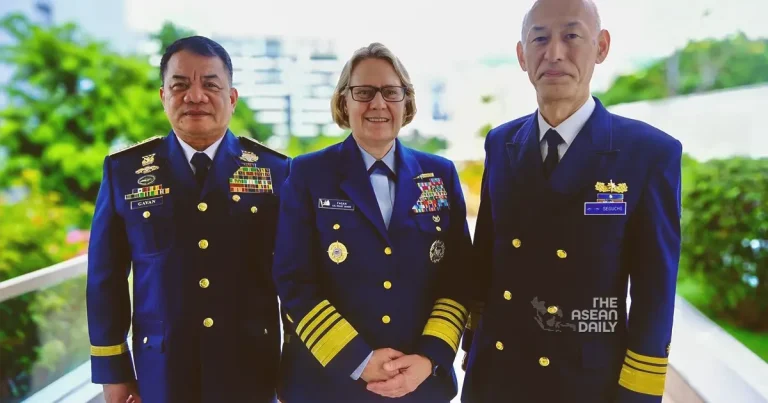5-6-2024 (MANILA) The United States Coast Guard (USCG) has promised to deploy assets to the South China Sea to support the Philippines in upholding its sovereign rights within its exclusive economic zone, according to a statement from the Philippine Coast Guard (PCG) on Tuesday.
The PCG revealed that the USCG will send its North Pacific Coast Guard to the region following a proposal by Admiral Ronnie Gil Gavan for a “greater deployment” in high seas “to address the forthcoming threat” as China prepares to implement a new regulation allowing the detention of perceived trespassers within its claimed maritime boundaries.
Gavan’s proposal was not only extended to the USCG but also to the Japan Coast Guard (JCG) during the International Institute for Strategic Studies Shangri-La Dialogue in Singapore. “I’d like to propose greater deployment in the high seas. We will do our part, but we also need you to be there to maintain rules-based order the way Coast Guards should play their role,” Gavan stated.
“We know our limits, but we know we can do something to give time for our political leaders to do their part to keep the West Philippine Sea as free as it should be,” he added.
USCG Commandant Admiral Linda Fagan confirmed her meeting with Gavan and JCG Vice Admiral Seguchi Yoshio in Singapore, noting the “increasingly central geopolitical role” maritime law enforcement agencies play in the Asia-Pacific region.
“They must demonstrate professional behavior at sea in order to support good maritime governance, which is critical to global economic prosperity and security. Malign activities such as human and drug trafficking, cyber-attacks, and illegal, unreported, and unregulated fishing drive instability and threaten the rules-based international order,” Fagan said in a separate statement.
Meanwhile, the JCG proposed conducting more personnel exchanges to create a robust network of coast guard counterparts in pursuit of maritime law enforcement and the rule of law.
The PCG agreed with the USCG and JCG to pursue capacity-building initiatives to strengthen people-to-people relationships, better synchronize doctrines on the ground, and develop trust with each other.
“Rest assured that the PCG is doing its share in the alliance we nurture. We are grateful for the new opportunities to further strengthen our ranks and fulfill our roles in the most unique way to address current challenges,” Gavan said.
On Wednesday, the Philippine Navy reported an increase in the number of China’s People’s Liberation Army Navy (PLAN) vessels in the West Philippine Sea, with a total of 125 vessels monitored in Philippine-occupied features from May 28 to June 3, including 9 China Coast Guard vessels, 11 PLAN vessels, and 105 Chinese maritime militia vessels.
In a related development, the Philippines hosted a forum for coast guards in the region on Wednesday. Gavan stated that the PCG was not keen on raising China’s aggression in the West Philippine Sea during the Association of Southeast Asian Nations (ASEAN) Coast Guard Forum, as attendees are not violating laws in international waters.
Instead, the forum focused on having a united understanding of maritime laws and policies, with Gavan emphasizing the importance of following the law and ensuring consistent enforcement based on a shared understanding of the laws and their implementation.




